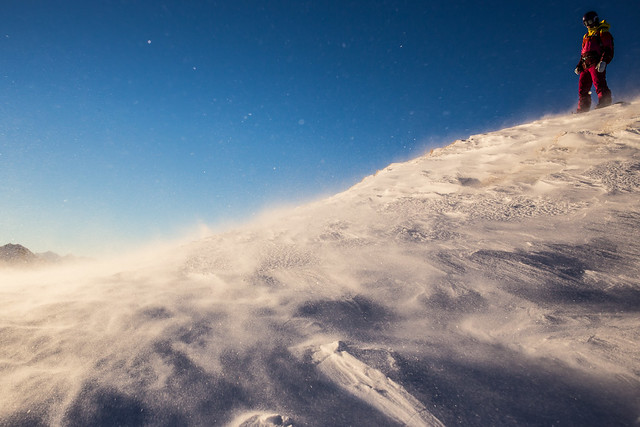foehn (fohn, föhn) /fən/. noun. A warm, dry wind blowing down a mountain valley, specifically the north side and usually referring to the Alps. See also: katabatic, a wind on the lee, or sheltered side of a mountain. Borrowed from German. From Latin Favōnius (the west wind; a wind god).
“Women is better, braver. In a foehn of loss
entire, which too they hotter understand,
having had it,
we struggle…”
(John Berryman)
“The wind blew from the south: an African wind, a foehn wind that tore the clouds to bits and then was gone.” (Hans Christian Andersen)
“…the man who shows no sign of reading continues to reflect on the fact that the names of the major planetary winds do not require capitals. Why not Trade Winds? Foehn? Sirocco? It seems to him that air currents ought to have the right to their proper identities, as do deserts, mountain ranges, and water currents. Why, indeed, should air currents deserve less recognition than those of water?” (France Daigel, trans. by Robert Majzels)
“Indeed, if these half-crippled hobblers could still hope to be cured, these rubber-tipped stick-walkers, if Baden could still help them, then my little beginner’s pains must disappear like snow in the foehn, and in me the doctor would see a shining example…” (Herman Hesse)
“…what to do or where to go in order to escape those migraines that troubled one end of him [Rilke] and the hemorrhoids that pained the other; because, if the sirocco and the bora were insufferable at Duino, there was the foehn to make Munich miserable, not to omit most of Switzerland, and his neuroses to ruin the rest.” (William Gass)
“I know about the monsoon belt of Southeast Asia, the dry winds that blow off the Gobi Desert for six months and the torrents of rain that follow from the Indian Ocean and the Bay of Bengal. I know about the great glaciers of Alaska, the century upon century of winter that has accumulated there. I know about the Alpine fohn and the vent du Midi. I know the paths of the tropical hurricane.” (Carol Maso)
“Probably the coldest winter Austria’s had in seventy-nine years, he thought. It always is. Where was the Fohn, that lecherous Lurleian breeze from the Austrian Alps which reputedly caressed the jeweled hair of Danube’s Queen?” (Ellery Queen)
“The Santa Ana, which is named for one of the canyons it rushes through, is a foehn wind, like the foehn of Austria and Switzerland and the hamsin of Israel. There are a number of persistent malevolent winds, perhaps the best known of which are the mistral of France and the Mediterranean sirocco, but foehn wind has distinct characteristics: it occurs on the leeward slope of a mountain range and, although the air begins as a cold mass, it is warmed as it comes down the mountain and appears finally as a hot dry wind. Whenever and wherever a foehn blows, doctors hear about headaches and nausea and allergies, about “nervousness,” about “depression.” In Los Angeles some teachers do not attempt to conduct formal classes during a Santa Ana, because the children become unmanageable. In Switzerland the suicide rate goes up during the foehn, and in the courts of some Swiss cantons the wind is considered a mitigating circumstance for crime.” (Joan Didion)




